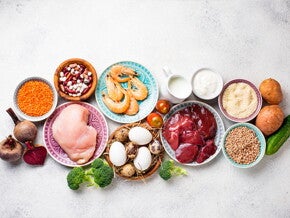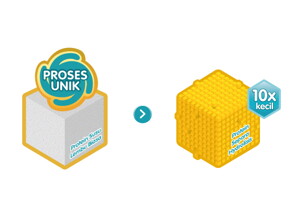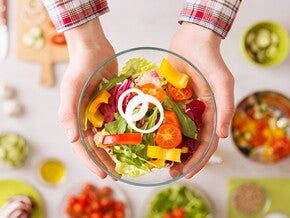
5 Things You Need To Know About Protein
What is “protein”, anyway? If we remember our high school biology right, it’s one of the building blocks of life, right?
What is “protein”, anyway?
If we remember our high school biology right, it’s one of the building blocks of life, right?
Before you go and hit up Wikipedia, we’ll tell you: yes, you’re right. And that’s exactly why your kid’s protein needs are important. But just how important is protein in your kid’s day to day life? We dug through piles of scientific research (so you don’t have to — you’re welcome) and were surprised by what we found out:
1. Protein is part of everything inside us.
Notice how when something is really important, it’s usually found in every aspect of a person’s life? Think clean air, drinking water... mobile phones. Protein is exactly that — it makes up your kid’s hair, skin, important organs —literally every cell of his or her body. So, what’s up with all this protein in our body?
2. Protein helps keep the body going.
Turns out, your kid’s protein needs are really important. Protein helps the body stay up and running. It helps repair damaged cells when we get hurt. Protein also makes sure that our immune system fights back when we get sick. And it even allows us to have back up energy when we aren’t eating enough. It is that essential in your child’s health.
3. Protein is part of our genetics.
Ever wonder why kids look like their parents?
Our features and characteristics, whether it’s your brown eyes or your hubby’s height, are passed on to our kids in their DNA, which is actually made up of proteins. But if you have light brown locks and hubby has a jet black crop, how do we know which one gets passed on? The question might sound trivial when we’re talking about hair color, but when you think about what this means for, say, a family history of obesity, then the implications on a child’s life suddenly takes on a different light. And although we can’t choose the traits that are passed on to us, there is actually a way to influence which genes are switched on or off and this is where protein can help. Studies have shown that the intake of protein in early life can influence a person’s risk for obesity. Imagine that!
4. Protein quality is important.
If the body needs protein so badly, we need to make sure we have a constant supply. Unfortunately, our bodies can’t make all types of protein all on its own. There are those that are called essential amino acids that need to be acquired from our food. Now, don’t take this as a license to stuff your kid with steak and eggs: more than the amount of protein you give them, it’s the type and quality of protein that they consume — especially early on in life — that determines what benefits they can derive from it.
Does your job as a parent sound tough yet? Don’t worry: it’s worth it, because…
5. Proteins contribute to your child’s good health, and good health means a better quality of life.
When your child’s body gets the nutrition it needs, and as you’ve read, protein makes a pretty significant contribution, he or she has the benefit of focusing on the important aspects of life — like, say, figuring out how to excel at school, or doing fun things with their parents. This greater freedom to do the things they want to do results in what researchers call “positive emotional and physical states of health”.
NANKID OPTIPRO HA 3 contains, Nestlé’s Most Advanced Protein to help meet your kid’s protein needs. Using a patented process, regular milk protein is broken into smaller pieces, making it easier to digest. It also contains DHA & ARA, which are found abundantly in the brain, as well as 100 million BIFIDUS BL probiotics from 3 glasses of NANKID OPTIPRO HA 3 daily. Probiotics are beneficial bacteria that can help support your child’s protection.
If you’re a parent, you’re probably seriously rethinking the kind of protein you’re giving (or going to be giving!) your kids. Head over to the Quality Protein section to learn more about the other neat stuff protein can do for your kid!
References:
1. Institute of Medicine: Dietary reference intakes for energy, carbohydrate, fiber, fat, fatty acids, cholesterol, protein, and amino acids. National Academy of Sciences, 2002/2005
2. Schneiderman, N. et al. Stress and health: psychological, behavioural, and biological determinants. Annu Rev ClinPsychol 2005; 1:607-628


























